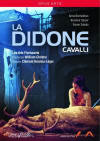Texte paru dans: / Appeared in:
*

Opera News: (02/2013)
Pour
s'abonner / Subscription information
Opus Arte
OA1080D

0809478010807 (ID248)
A live performance from October 2011 at the Théâtre de Caen affords a superb introduction to Cavalli's rarely performed 1641 opera La Didone. William Christie leads Les Arts Florissants in beautifully realized period style, while French stage actor Clément Hervieu-Léger, in his operatic directorial debut, draws powerful and moving characterizations from a large, versatile cast.
Gods, goddesses, semi-gods, demi-gods, royalty, heroes, ambassadors, hunters, ladies-in-waiting and plenty of others populate the story, loosely based on Virgil's Aeneid. As Venetian audiences demanded, comic characters lend relief, however jarring, while Jove, Juno, Iris, Venus, Neptune and Mercury exhibit humanizing traits. (Venus flirts openly with Aeneas, who doesn't recognize his own mother.) Other capitulations to then-current fads are a gratuitous mad scene for Dido's rejected suitor Iarbas and a requisite happy ending, effected when the abandoned Dido at last accepts the hand of this same persistent — and now sane — Iarbas. (The DVD booklet includes a short essay but no track list or added features, so character identification can be difficult.)
Act I, set amid the ruins of the still-burning city of Troy, represents Cavalli and the Venetian style at their best, with incisive recitative writing and fluid musical movement in response to Busenello's fine libretto. Corebus's death in the arms of Cassandra, Hecuba's lament for the fallen empire, Creusa's plea to her husband, Aeneas, and her later appearance as a ghost are potent dramatic moments, realized with uncommon power and commitment by Hervieu-Léger and his cast. The direction of physical movement is precise and hauntingly effective (especially the silent love-scene between Dido and Aeneas). Christie's continuo section is especially fine, lending support and color to the dramatic flow and creating atmospheric textures for the more static aria moments.
Éric Ruf's sets feature Troy's battered walls with high battlements, where the goddess Iris sets the plot in motion in a visually striking placement. Dido's Carthaginian palace is represented by an elegant wooden façade with stairs, double paneled doors and a huge arch framing a startlingly blue sky. Gods and goddesses appear on nearby modern metal scaffolding draped with translucent cloths. Costumes by Caroline de Vivaise suggest timeless elegance with touches of humor, such as a slouchy sweater and chinos for Cupid (the excellent young singing actor Terry Wey, who doubles as a sweet-voiced Ascanio).
Alert acting and sensitive singing characterize both the Dido of Anna Bonitatibus and the Aeneas of Kresimir Spicer, and their intense performances bring out all the power of this elusive early operatic style. Her dark, incisive voice and regal bearing soften at the first sight of Spicer's bold yet tender Aeneas, and she inhabits the role arrestingly. Spicer's responsive tenor and emotional commitment are stunning throughout, most especially in his delicate handling of Aeneas's guilt, conflict and pain as he parts from Dido.
Countertenor Xavier Sabata sings the role of Iarbas with intelligence and elegance, but Maria Streijffert struggles with the low-lying role of Hecuba, and her hysterical characterization never finds a vocal center. Other singers handle multiple roles with verve and style, particularly Katherine Watson as an affecting Cassandra, Mariana Rewerski as a fresh-voiced Anna, Tehila Nini Goldstein as Creusa and Juno, and Claire Debono as a fun-loving Venus. Victor Torres brings warmth to the role of Anchises, while Joseph Cornwell is a strikingly effective Sychaeus, in another ghostly appearance from a dead spouse. Francisco Javier Borda is a comical and deep-toned Neptune and Jove, but tenor Mathias Vidal's shouted and out-of-tune Ilioneus and Mercury are jarring in such a uniformly elegant and stylish production.
Cliquez l'un ou l'autre
bouton pour découvrir bien d'autres critiques de CD
Click either button for many other reviews


